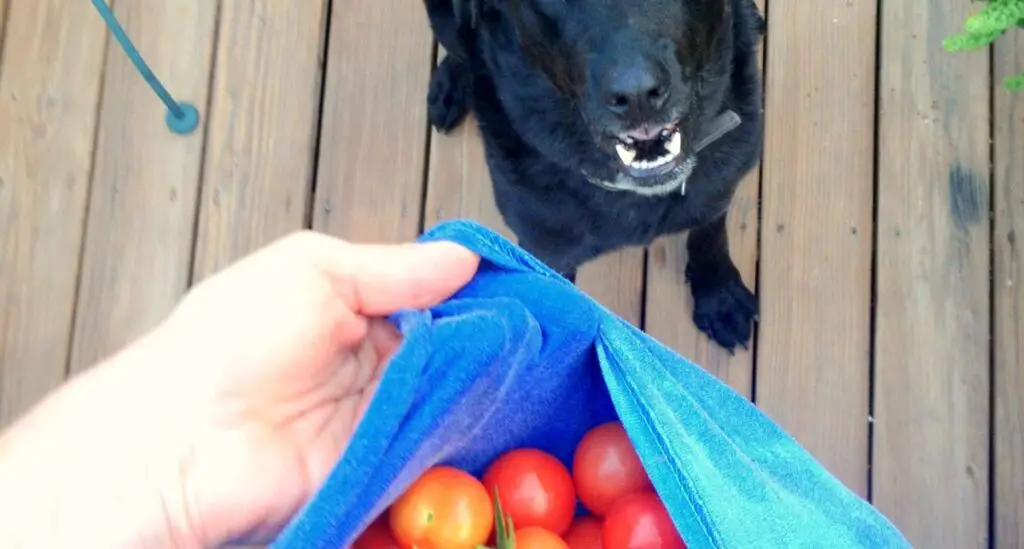The key to keeping your pup healthy and safe is to know what amount of tomatoes is considered safe for them to eat.
A good rule of thumb for diabetic dogs is to give no more than one small tomato per day.
Read on to find out more about tomatoes and how they can be beneficial for diabetic dogs.
Can Diabetic Dogs Eat Tomatoes

Yes, diabetic dogs can eat tomatoes because of their low glycemic index of only 15. This means that tomatoes do not cause a huge spike in blood sugar levels.
Tomatoes can be a healthy and tasty treat for diabetic dogs, as long as they are given in moderation.
Tomatoes are rich in antioxidants, vitamins, and minerals, making them an excellent source of nutrition.
When feeding tomatoes to diabetic dogs, it is important to always keep portions small.
A single tomato should provide enough nutrients without containing too much sugar.
Likewise, when giving canned tomatoes or other prepared tomato products such as ketchup or sauce, it is best to stick with low-sugar varieties that have no added sugar or sweeteners.
Additionally, any leftovers should be refrigerated immediately after serving as the sugar content in these products can increase with time.
How Many Tomatoes Can Diabetic Dogs Eat
To prevent blood sugar spikes in diabetic dogs, it is advised to limit their consumption of tomatoes to 3-6 grams of carbohydrate per day – approximately ½-1 small tomato or ⅓-⅔ of a large tomato.
As a guideline, one medium-sized tomato contains about 6 grams of carbohydrates.
Tomatoes can be a healthy addition to your diabetic dog’s diet.
But, it is important to remember that all fruits and vegetables contain carbohydrates.
Therefore, it is essential to monitor the number of tomatoes fed to your diabetic dog.
It is also important to note that the glycemic index (GI) may differ depending on how ripe the tomato is.
So, adding different varieties such as cherry or heirlooms can help keep the GI low.
Too much of anything is not good for a diabetic animal (or person).
For that reason, it’s key to understand the glycemic index which is the measure of how quickly glucose enters your pet’s bloodstream after consuming certain foods.
The higher the GI rating on a food item, the faster glucose enters the bloodstream.
Luckily, tomatoes have a glycemic index of only 15 and are safe for diabetic dogs.
Health Benefits of Tomatoes For Diabetic Dogs
- Low glycemic index: Tomatoes are a low glycemic index food. This means they have less of an impact on blood sugar levels than most other foods. This makes them a great choice for dogs with diabetes, as it helps keep their glucose levels steady and reduces the risk of dangerous spikes or drops in insulin levels.
- Antioxidant properties: Tomatoes are packed full of antioxidants, including lycopene, which can help protect against oxidative damage and reduce inflammation in your dog’s body. This can be particularly beneficial for diabetic dogs who may be at an increased risk of chronic illnesses due to their condition.
- Protective effects against heart disease: Lycopene is also known to have protective effects against heart disease, which can be a common complication of diabetes in dogs. Eating tomatoes can help reduce the risk of this potentially serious problem.
- Improved blood sugar regulation: Studies have shown that lycopene can also help improve insulin sensitivity and reduce fasting glucose levels. Both of these are important for managing diabetes in dogs.
- Nutrient-dense: Tomatoes are a great source of many essential nutrients, including vitamin C, folate, potassium, and manganese. These vitamins and minerals are essential for overall health and well-being, as well as helping to regulate blood sugar levels.
- Low-calorie snack: Tomatoes contain very few calories per serving size so they make a great low-calorie snack for diabetic dogs. They are also high in fiber, which can help keep your dog feeling fuller for longer and reduce their urge to snack on unhealthy foods.
- Reduced risk of other chronic illnesses: Due to their antioxidant content, tomatoes may help reduce the risk of other chronic illnesses such as cancer, Alzheimer’s disease, and age-related vision loss. This can be especially beneficial for diabetic dogs who are at an increased risk of these conditions due to their condition.
How To Tomatoes Prepare For Diabetic Dogs
1. Tomato and Oat Casserole
This tasty casserole is a great way to get your diabetic pup the nutrients they need without breaking its diet.
In a bowl, combine 1 cup of cooked oats, 2 diced tomatoes, 1/4 cup of grated carrots, and 1/4 cup of canned pumpkin puree.
Put this mixture into an oven-safe dish and bake at 350°F for 20 minutes. Let cool before serving it to your pup!
2. Tomato and Veggie Stir Fry
This nutritious meal is packed with vitamins and minerals that are essential for managing diabetes in dogs.
Heat up a wok on the stove with some olive oil before adding 2 cups of broccoli florets, 2 diced tomatoes, 1/4 cup of diced bell peppers, and 1 cup of cooked brown rice.
Stir-fry the ingredients together for 5 minutes before serving your pup the meal.
3. Tomato Soup
This simple recipe is a great way to add flavor and nutrition to any dog’s diet without compromising their health.
In a pot, combine 2 cups of vegetable broth, 2 chopped tomatoes, 1/2 cup of frozen green peas, and 1/2 cup of diced carrots.
Bring everything to a boil before reducing the heat to low and simmering for 15 minutes. Serve your pup this warm soup during dinner time!
In Conclusion
Overall, tomatoes are an excellent source of essential vitamins and minerals for all dogs, including those who have diabetes.
However, like all other foods, keep the portions small while taking into account that each dog is different when determining how much tomato product to feed them at one time.





Leave a Reply